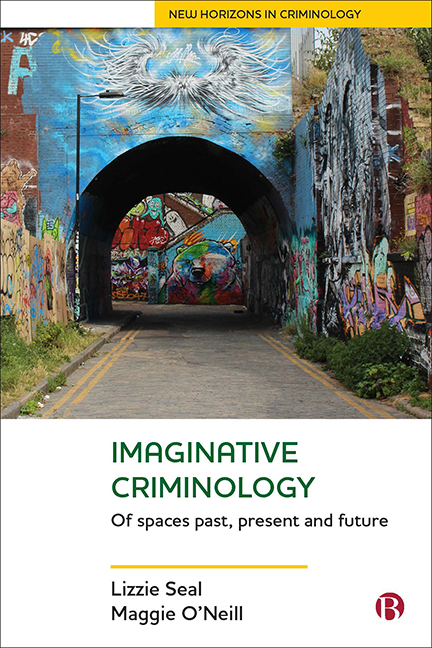Book contents
- Frontmatter
- Contents
- List of figures and tables
- Preface
- 1 Imaginative Criminologies of Space: the Spaces of Imaginative Criminology
- 2 Historical Spaces of Confinement 1: Homes for Indigenous Children in Australia
- 3 Historical Spaces of Confinement 2: Magdalene Laundries
- 4 Creative Writing and the Imagined Spaces of Imprisonment
- 5 Border Spaces and Places: the Age of the Camps
- 6 Imagining Spaces of Violence and Transgression in Vancouver and Northern Ireland
- 7 Imagining Dystopian Futures in Young Adult Fiction
- 8 Conclusion
- References
- Index
8 - Conclusion
Published online by Cambridge University Press: 30 April 2022
- Frontmatter
- Contents
- List of figures and tables
- Preface
- 1 Imaginative Criminologies of Space: the Spaces of Imaginative Criminology
- 2 Historical Spaces of Confinement 1: Homes for Indigenous Children in Australia
- 3 Historical Spaces of Confinement 2: Magdalene Laundries
- 4 Creative Writing and the Imagined Spaces of Imprisonment
- 5 Border Spaces and Places: the Age of the Camps
- 6 Imagining Spaces of Violence and Transgression in Vancouver and Northern Ireland
- 7 Imagining Dystopian Futures in Young Adult Fiction
- 8 Conclusion
- References
- Index
Summary
Our aim in this book has been to argue for and do imaginative criminology. Through a range of contrasting and complementary examples, we have shown the rich analysis that emerges from the use of creative methodologies and the examination of biographical and fictive sources. In this concluding chapter, we return to the notion of the criminological imagination and how it might be expanded. We reflect on our main findings and arguments, and our theoretical contributions. We also highlight certain key areas for further development in criminology, in terms of both empirical and conceptual work.
There are three main prongs to the sociological imagination: attention to the social structure; attention to place in history; and attention to the biographical and experiential (Wright Mills, 1959; Frauley, 2015b; O’Neill et al, 2015). Imaginative criminology engages with all three. Our methodological toolbox enables deep engagement with the biographical and experiential. The oral history interviews utilised with Indigenous Australians removed to children's homes in Chapter 2 and women who spent time in Magdalene laundries in Chapter 3 are of course deeply biographical and shed light on the lived experience of these institutions. They unlock personal memories and illustrate how memory involves mediation between past and present, personal identity and past experience and individual and collective memories (Thomson, 2007; Seal, 2014). Publicly accessible online archives of oral history testimonies form part of cultural memory. Similarly, memoir and documentaries are sources involving the articulation of lived experience and memory in order to tell stories about the social world (Roberts, 2015).
Creative writing is another way to express personal biography and experience, as is evocatively demonstrated by the poems written by prisoners in Chapter 4. These communicate the subjective experience of incarceration and how state power enacted through punishment is felt and lived by individuals. Unlike oral history testimony, creative writing enables the writer to exceed their own story and to imagine other lives and contexts. The ghost stories also discussed in Chapter 4 offer trenchant examples of this, in which themes of haunting and trauma predominate. Creative methodologies such as writing present criminologists with the possibility of transcending positivist conceptions of truth and objectivity and enabling subjective expression. This is a different kind of ‘data’ from that which criminologists usually collect, even when they use qualitative methods.
- Type
- Chapter
- Information
- Imaginative CriminologyOf Spaces Past, Present and Future, pp. 133 - 142Publisher: Bristol University PressPrint publication year: 2019



